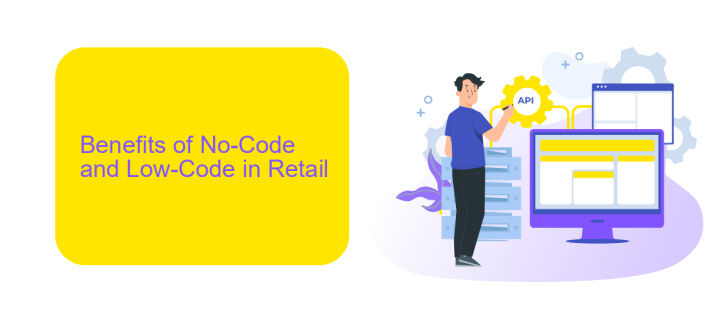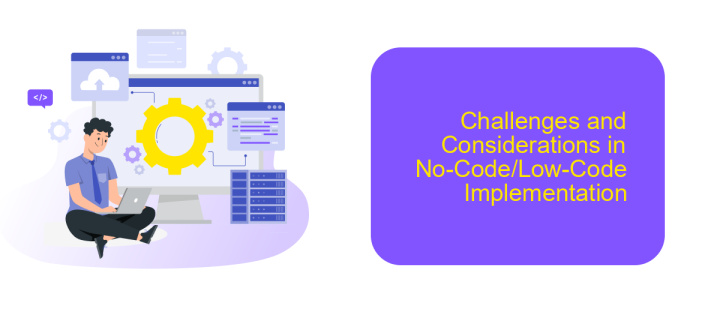No-Code and Low-Code in Retail
In the rapidly evolving retail landscape, no-code and low-code platforms are revolutionizing the way businesses operate. These innovative solutions empower retailers to develop and deploy applications swiftly without extensive programming knowledge. By leveraging these technologies, retail companies can enhance customer experiences, streamline operations, and stay competitive in an increasingly digital marketplace. Discover how no-code and low-code are transforming retail today.
Introduction: Understanding No-Code and Low-Code Development
No-Code and Low-Code development platforms are revolutionizing the way businesses approach software creation. These platforms enable users with little to no programming experience to build, customize, and deploy applications quickly and efficiently. This democratization of software development is particularly beneficial in the retail industry, where agility and innovation are key to staying competitive.
- No-Code platforms: Enable users to create applications using visual interfaces and drag-and-drop features without writing any code.
- Low-Code platforms: Allow users to build applications with minimal hand-coding, combining visual development tools with the flexibility of manual coding when necessary.
- Integration tools: Services like ApiX-Drive help in seamlessly integrating various applications and automating workflows, enhancing overall productivity.
By leveraging No-Code and Low-Code platforms, retailers can quickly adapt to market changes, personalize customer experiences, and streamline operations. These tools not only reduce development time and costs but also empower non-technical staff to contribute to the digital transformation of their organizations. As a result, retail businesses can focus more on innovation and less on the complexities of traditional software development.
Benefits of No-Code and Low-Code in Retail

No-Code and Low-Code platforms offer significant benefits to the retail industry by drastically reducing the time and cost associated with software development. Retailers can quickly create and deploy applications without needing extensive coding knowledge, allowing them to respond swiftly to market changes and customer demands. This agility helps in optimizing operations, enhancing customer experiences, and driving sales growth. Additionally, these platforms enable retailers to experiment with new ideas and innovations, fostering a culture of continuous improvement and adaptability.
Another advantage is the ease of integrating various systems and services. Tools like ApiX-Drive facilitate seamless integration between different applications, enabling retailers to automate workflows and streamline operations. This integration capability ensures that data flows smoothly across systems, improving accuracy and efficiency. By leveraging No-Code and Low-Code solutions, retailers can focus more on strategic initiatives and less on technical complexities, ultimately leading to better business outcomes and a competitive edge in the market.
Use Cases and Applications in the Retail Industry

No-Code and Low-Code platforms are revolutionizing the retail industry by enabling businesses to quickly adapt to market demands and streamline operations without extensive coding knowledge. These platforms offer a variety of use cases that enhance efficiency and customer experience.
- Inventory Management: Retailers can develop custom inventory management systems to track stock levels in real-time, ensuring products are always available.
- Customer Relationship Management (CRM): No-Code solutions allow for the creation of personalized CRM systems to better understand and engage with customers.
- Point of Sale (POS) Systems: Retailers can design and implement custom POS systems tailored to their specific needs, improving transaction efficiency.
- Integration with Third-Party Services: Tools like ApiX-Drive facilitate seamless integration with various third-party applications, automating workflows and data synchronization.
- Marketing Automation: Low-Code platforms enable the creation of automated marketing campaigns, helping retailers reach their target audience more effectively.
By leveraging No-Code and Low-Code platforms, retailers can innovate rapidly, reduce operational costs, and deliver a superior customer experience. These technologies empower retail businesses to stay competitive in a fast-paced market environment.
Challenges and Considerations in No-Code/Low-Code Implementation

Implementing no-code and low-code solutions in the retail industry presents unique challenges and considerations. One major challenge is ensuring these platforms can handle the complexity and scale of retail operations, which often involve intricate inventory management, customer relationship management, and point-of-sale systems.
Another consideration is the integration with existing systems. Retailers typically use a variety of software solutions, and seamless integration is crucial for efficient operations. Services like ApiX-Drive can facilitate these integrations, allowing retailers to connect different systems without extensive coding knowledge.
- Scalability issues as the business grows
- Security concerns and data privacy
- Customization limitations of no-code/low-code platforms
- Dependence on the platform provider for updates and support
Despite these challenges, no-code and low-code solutions offer significant benefits, such as faster deployment and reduced development costs. Retailers must carefully evaluate their specific needs and choose platforms that offer robust integration capabilities, like those provided by ApiX-Drive, to ensure a smooth implementation process.
- Automate the work of an online store or landing
- Empower through integration
- Don't spend money on programmers and integrators
- Save time by automating routine tasks
Future Trends and Innovations in No-Code/Low-Code for Retail
The future of no-code and low-code platforms in retail is poised for remarkable growth, driven by advancements in AI and machine learning. Retailers are increasingly adopting these technologies to create personalized shopping experiences and optimize operations. AI-powered no-code tools enable retailers to analyze customer data, predict trends, and automate inventory management, all without needing extensive programming knowledge. This shift is empowering retail professionals to innovate rapidly and respond to market demands with agility.
Integration capabilities are also set to advance, making it easier for retailers to connect various systems and applications seamlessly. Services like ApiX-Drive are at the forefront of this trend, offering user-friendly solutions for integrating different platforms without coding expertise. This allows retailers to streamline operations, enhance customer experiences, and drive sales through more efficient workflows. As no-code and low-code platforms continue to evolve, we can expect even more sophisticated tools that democratize technology, enabling retailers to stay competitive in a fast-paced market.
FAQ
What is No-Code and Low-Code in retail?
How can No-Code and Low-Code platforms benefit retail businesses?
Can No-Code and Low-Code platforms integrate with existing retail systems?
Are No-Code and Low-Code solutions secure for retail applications?
What are some common use cases for No-Code and Low-Code in retail?
Apix-Drive is a universal tool that will quickly streamline any workflow, freeing you from routine and possible financial losses. Try ApiX-Drive in action and see how useful it is for you personally. In the meantime, when you are setting up connections between systems, think about where you are investing your free time, because now you will have much more of it.


